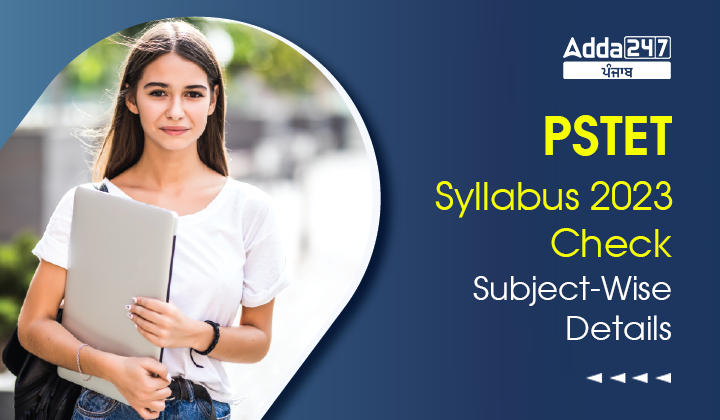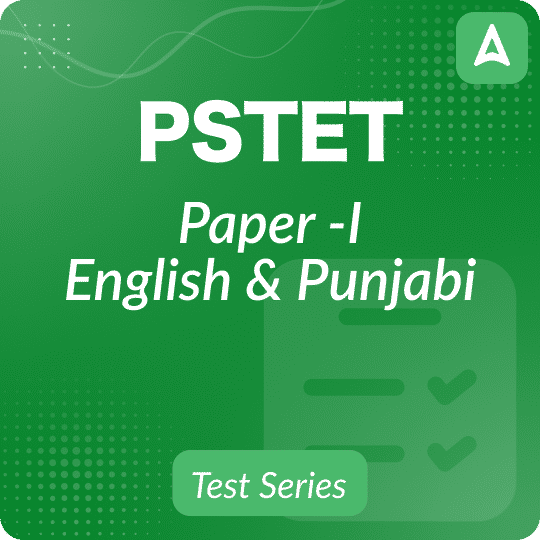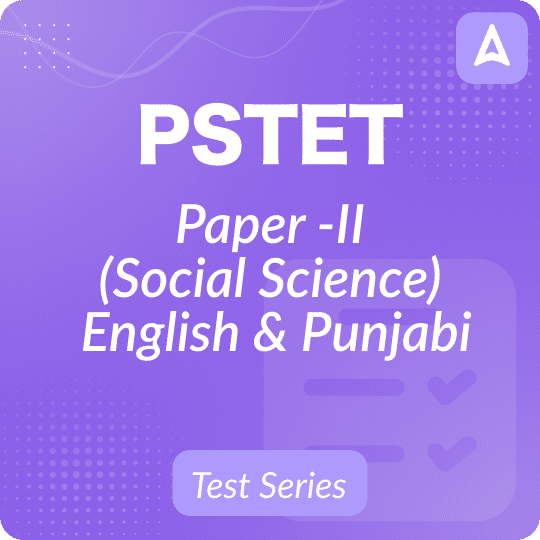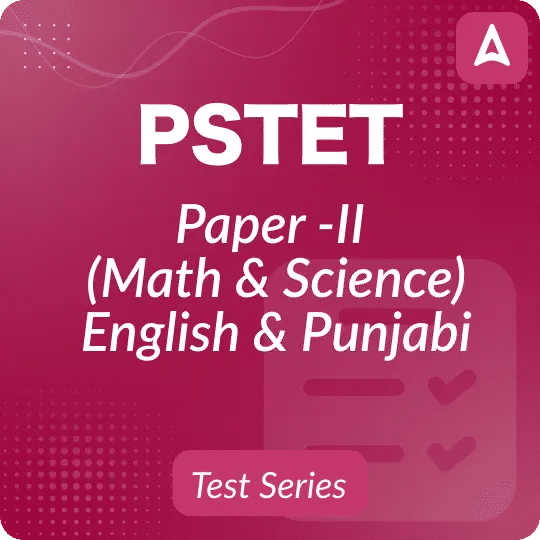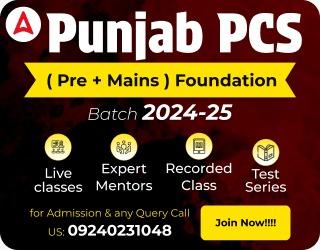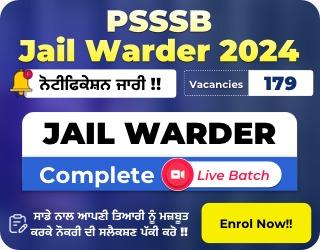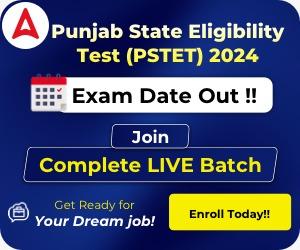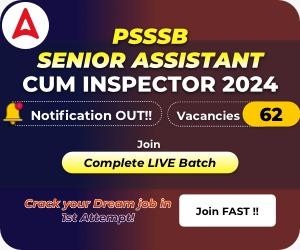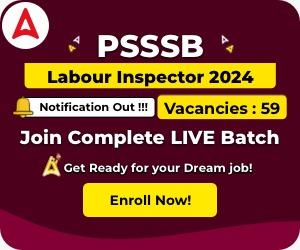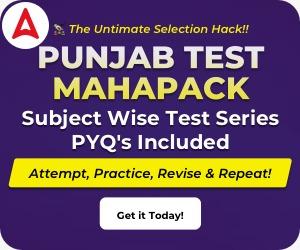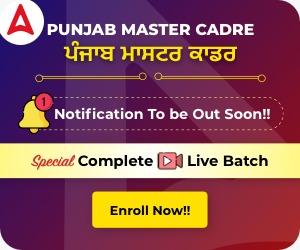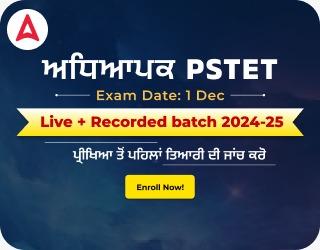PSTET Syllabus 2023: Punjab School Education Board has released the Punjab State Teacher Eligibility Test (PSTET) 2023 Syllabus. All the aspirants are informed with respect to the written test to be conducted for the PSTET 2023. Candidates who want to teach in Punjab state must appear for the exam to get the PSTET Qualified certificate. To Ace the Exam, one must go through the detailed PSTET Syllabus 2023.
Candidates can check the necessary details related to PSTET 2023 Papers 1 and 2 in this article.
PSTET Notification 2023
PSTET Syllabus 2023 Overview
PSTET Syllabus 2023: Candidates applying for PS Teacher Eligibility Test 2023 must go through the PSTET Syllabus. This will help you to prepare for PSTET Exam 2023. Check the overview of the PSTET Syllabus 2023 mentioned below in the table. All questions in PSTET will be Multiple Choice Questions (MCQs). There will be two papers of PSTET: Paper 1 (for classes I to V): Primary Stage and Paper -2 (for classes VI to VIII) Elementary Stage
| PS TET Syllabus 2023 Overview |
| Exam Name |
PS Teacher Eligibility Test 2023
|
| Organization |
PSEB |
| Category |
PSTET Syllabus 2023 |
| PS TET Notification 2023 |
Released |
| Type of Exam |
Teacher Eligibility Test |
| Exam Level |
State Level |
| PS TET Exam |
Papers 1 & 2 |
| PSEB Official website |
pstet.pseb.ac.in |
PSTET Syllabus 2023 Paper 1
PSTET Syllabus 2023: PSTET Paper 1 will be for a person who intends to become a teacher for classes 1 to 5 (Primary Teacher) and fulfills the minimum qualification. Any candidate who wants to get brief information about the topics asked in PSTET 2023 Paper 1 exam to get an idea. They can find all information about Pstet Syllabus 2023 paper 1 in the table below.
| PSTET Syllabus 2023 Paper – 1 (for classes I to V) Primary Stage |
| Subject |
Part |
Units |
| I. Child Development and Pedagogy |
a.) Child Development (Primary School Child) |
- Concept of development and its relationship with learning
- Principles of Development of Children
- Influence of Heredity and Environment
- Socialization processes: Social world & children (Teachers, Parents, and Peers)
- Piaget, Kohlberg, and Vygotsky: constructs and critical perspectives
- Concepts of child-centered and progressive education
- Critical Perspective of the Construct of Intelligence
- Multi-Dimensional Intelligence
- Language and Thought
- Gender as a social construct: gender roles, gender-bias, and educational practice
- Individual differences among learners, understanding differences based on diversity of language, caste, gender, community, religion, etc.
- The distinction between Assessment for learning and assessment of learning; School-Based Assessment, Continuous and Comprehension Evaluation: Perspective and practice
- Formulating appropriate questions for assessing the readiness levels of learners; enhancing learning and critical thinking in the classroom and assessing learner achievement
|
| b.) Concept of Inclusive Education and understanding children with special needs |
- Addressing learners from diverse backgrounds including disadvantaged and deprived
- Addressing the needs of children with learning difficulties, impairment, etc.
- Addressing the Talented, Creative, Specially abled learners
|
| c.) Learning and Pedagogy |
- How children think and learn; how and why children ‘fail’ to achieve success in school performance
- Basic processes of teaching and learning; children’s strategies of learning; learning as a social activity; social context of learning
- Child as a problem solver and a ‘scientific investigator’
- Alternative conceptions of learning in children, understanding children’s ‘errors’ as significant steps in the learning process
- Cognition and Emotions
- Motivation and Learning
- Factors contributing to learning – Personal and environmental
|
| II. Language- I (Punjabi) |
a.) Language Comprehension |
- Reading unseen passage – two passages: one prose/drama and one poem with questions on comprehension, inference, grammar, and verbal ability (Prose passage may be literary, scientific, narrative, or discursive)
|
| b.) Pedagogy of Language development |
- Learning and Acquisition
- Principles of Language Teaching
- Role of listening and speaking; function of language and how children use it as a tool
- Critical Perspective on the Role of Grammar in Learning a Language for communicating ideas verbally or in written form
- Challenges of teaching language in a diverse classroom; language difficulties, errors, and disorders
- Language skills
- Evaluating language comprehension and proficiency: Listening, Speaking, Reading and Writing
- Teaching-Learning Materials: Text-books, multi-media materials, multilingual resources of the classroom
- Remedial Teaching
|
| III. Language – II (English) |
a.) Comprehension |
- Two unseen prose passages (discursive/literary/narrative/scientific) with questions on comprehension, grammar, and verbal ability
|
| b.) Pedagogy of Language Development |
- Learning and Acquisition
- Principles of Language Teaching
- Role of listening and speaking; function of language and how children use it as a tool
- Critical Perspective on the Role of Grammar in Learning a Language for communicating ideas verbally or in written form
- Challenges of teaching language in a diverse classroom; language difficulties, errors, and disorders
- Language skills
- Evaluating language comprehension and proficiency: Listening, Speaking, Reading and Writing
- Teaching-Learning Materials: Text-books, multi-media materials, multilingual resources of the classroom
- Remedial Teaching
|
| IV. Mathematics |
a.) Content |
- Geometry
- Shapes and Spatial Understanding
- Solids around us
- Numbers
- Addition and Subtraction
- Multiplication
- Division
- Measurement
- Weight
- Time
- Volume
- Data Handling
- Patterns
- Money
|
| b.) Pedagogical Issues |
- Nature of Mathematics / Logical Thinking; understanding children’s thinking and reasoning patterns and strategies for making meaning and learning
- Place of Mathematics in Curriculum
- Language of Mathematics
- Community Mathematics
- Evaluation through formal and informal methods
- Problems of teaching
- Error analysis and related aspects of teaching and learning
- Diagnostic and remedial teaching
|
| V. Environmental Studies |
a.) Content |
Family and Friends
- Relationships
- Work and Play
- Animals
- Plants
- Food
- Shelter
- Water
- Travel
- Things We Make and Do
|
| b.) Pedagogical Issues |
- Concept and scope of EVS
- Significance of EVS integrated EVS
- Environmental Studies and Environmental Education
- Learning Principles
- Scope and Relation to Science and Social Science
- Approaches of presenting concepts
- Activities
- Experimentation / Practical Work
- Discussion
- CCE
- Teaching Material / Aids
- Problems of teaching
|
PSTET Syllabus 2023 Paper 2
PSTET Syllabus 2023: PSTET Paper 2 will be for a person who intends to become a teacher for classes VI to VIII (TGT- Trained Graduate Teacher) and meets the minimum qualifications. Any candidate who wants to get brief information about the topics asked in PSTET 2023 Paper 2 exam to get an idea. They can find all information about Pstet Syllabus 2023 paper 2 in the table below.
| PTET Syllabus 2023 Paper – 2 (for classes VI to VIII) Elementary Stage |
| Subject |
Part |
Units |
| 1. Child Development and Pedagogy |
a.) Child Development (Elementary School child) |
- Concept of development and its relationship with learning
- Principles of Development of the Child
- Influence of Heredity and Environment
- Socialization processes: Social world and children (Teachers, Parents, and Peers)
- Piaget, Kohlberg, and Vygotsky: constructs and critical perspectives
- Concepts of child-centered and progressive education
- Critical Perspective of the Construct of Intelligence
- Multi-Dimensional Intelligence
- Language and Thought
- Gender as a social construct: gender roles, gender-bias, and educational practice
- Individual differences among learners, understanding differences based on diversity of language, caste, gender, community, religion, etc.
- The distinction between Assessment for learning and assessment of learning; School-Based Assessment, Continuous and Comprehension Evaluation: Perspective and practice
- Formulating appropriate questions for assessing the readiness levels of learners; for enhancing learning and critical thinking in the classroom and for assessing learner achievement
|
b.) Concept of Inclusive Education and understanding children with special
needs |
- Addressing learners from diverse backgrounds including disadvantaged and deprived
- Addressing the needs of children with learning difficulties, ‘impairment’ etc.
- Addressing the Talented, Creative, Specially abled learners
|
| c.) Learning and Pedagogy |
- How children think and learn; how and why children ‘fail’ to achieve
success in school Performance
- Basic processes of teaching and learning; children’s strategies of learning; learning as a social activity; social context of learning
- Child as a problem solver and a ‘scientific investigator’
- Alternative conceptions of learning in children, understanding children’s ‘errors’ as significant steps in the learning process
- Cognition and Emotions
- Motivation and Learning
- Factors contributing to learning – Personal and environmental
|
| 2. Language-I (Punjabi) |
a.) Language Comprehension |
- Reading unseen passage – two passages: one prose/drama and one poem with questions on comprehension, inference, grammar, and verbal ability (Prose passage may be literary, scientific, narrative, or discursive)
|
| b.) Pedagogy of Language development |
- Learning and Acquisition
- Principles of Language Teaching
- Role of listening and speaking; function of language and how children use it as a tool
- Critical Perspective on the Role of Grammar in Learning a Language for communicating ideas verbally or in written form
- Challenges of teaching language in a diverse classroom; language difficulties, errors, and disorders
- Language skills
- Evaluating language comprehension and proficiency: Listening, Speaking, Reading and Writing
- Teaching-Learning Materials: Text-books, multi-media materials, multilingual resources of the classroom
- Remedial Teaching
|
| 3. Language – II (English) |
a.) Comprehension |
- Two unseen prose passages (discursive/literary/narrative/scientific) with questions on comprehension, grammar, and verbal ability
|
| b.) Pedagogy of Language Development |
- Learning and Acquisition
- Principles of Language Teaching
- Role of listening and speaking; function of language and how children use it as a tool
- Critical Perspective on the Role of Grammar in Learning a Language for communicating ideas verbally or in written form
- Challenges of teaching language in a diverse classroom; language difficulties, errors, and disorders
- Language skills
- Evaluating language comprehension and proficiency: Listening, Speaking, Reading and Writing
- Teaching-Learning Materials: Text-books, multi-media materials, multilingual resources of the classroom
- Remedial Teaching
|
| IV. Mathematics & Science |
Mathematics
a.) Content |
- Number System
- Knowing our Numbers
- Playing with Numbers
- Whole Numbers
- Negative Numbers and Integers
- Fractions
2. Algebra
- Introduction to Algebra
- Ratio and proportion
3. Geometry
- Basic Geometrical Ideas (2-D)
- Understanding Elementary Shapes (2-D and 3-D)
- Symmetry : (reflection)
- Construction (using straight edge scale, protector, compasses)
- Mensuration
- Data Handling
|
| b. Pedagogical Issues |
- Nature of Mathematics / Logical Thinking
- Place of Mathematics in Curriculum
- Language of Mathematics
- Community Mathematics
- Evaluation
- Remedial Teaching
- Problems of teaching
|
| ii. Science
a.) Content |
i. Food
- Sources of food
- Components of food
- Cleaning food
ii. Materials
iii. The world of the living
iv. Moving things, people, and ideas
v. How things work
- Electric currents and circuits
- Magnets
VI. Natural Phenomena
VII. Natural Resources |
| b.) Pedagogical Issues |
- Nature and Structure of Sciences
- Natural Science / Aims and Objectives
- Understanding & Appreciating Science
- Approaches / Integrated Approach
- Observation / Experiment / Discovery (Method of Science)
- Innovation
- Text Materials / Aids
- Evaluation – cognitive/psychomotor/affective
- Problems
- Remedial Teaching
|
| V. Social Studies / Social Sciences |
a.) Content |
i. History
- When, Where, and how
- The Earliest Societies
- The First Farmers and Herders
- The First Cities
- Early States
- New Ideas
- The First Empire
- Contacts with Distant lands
- Political Developments
- Culture and Science
- New Kings and Kingdoms
- Sultans of Delhi
- Architecture
- Creation of an empire
- Social Change
- Regional Cultures
- The Establishment of Company Power
- Rural Life and Society
- Colonialism and Tribal Societies
- The Revolt of 1857-58
- Women and Reform
- Challenging the Caste System
- The Nationalist Movement
- India after Independence
ii. Geography
- Geography as a social study and as a science
- Planet: Earth in the Solar system
- Globe
- The environment in its totality: natural and human environment
- Air
- Water
- Human Environment: settlement, transport, and communication
- Resources: Types-Natural and Human
- Agriculture
iii. Social and Political Life
- Diversity
- Government
- Local Government
- Making a Living
- Democracy
- State Government
- Understanding Media
- Unpacking Gender
- The Constitution
- Parliamentary Government
- The Judiciary
- Social Justice and the Marginalised
|
| b.) Pedagogical Issues |
- Concept and Nature of Social Sciences / Social Studies
- Classroom Processes, activities, and Discourse
- Developing Critical Thinking
- Inquiry / Empirical Evidence
- Problems of Teaching Social Sciences / Social Studies
- Sources – Primary & Secondary
- Project Work
- Evaluation
|
PSTET Syllabus 2023 Download PDF
PSTET Syllabus 2023: Any candidate who wants to get brief information about the PSTET Syllabus 2023 Paper 1 & 2, can find all information in this given PDF link. Candidates can download PSTET Syllabus PDF. Candidates can refer to PDF for better knowledge about PSTET Syllabus 2023 Paper 1 & 2.
Download PDF: PSTET Syllabus 2023 PDF

Enroll Yourself: Punjab Da Mahapack Online Live Classes
Download Adda 247 App here to get the latest updates

